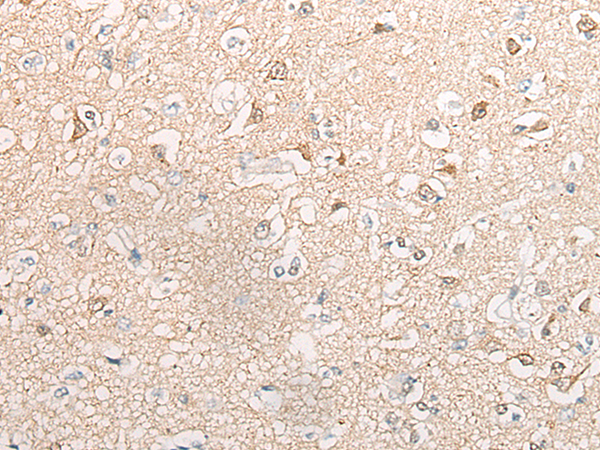
| WB | 咨询技术 | Human,Mouse,Rat |
| IF | 咨询技术 | Human,Mouse,Rat |
| IHC | 1/20-1/100 | Human,Mouse,Rat |
| ICC | 技术咨询 | Human,Mouse,Rat |
| FCM | 咨询技术 | Human,Mouse,Rat |
| Elisa | 1/1000-1/2000 | Human,Mouse,Rat |
| Aliases | ACT; ACH1; BACH; LACH; LACH1; hBACH; CTE-II |
| Host/Isotype | Rabbit IgG |
| Antibody Type | Primary antibody |
| Storage | Store at 4°C short term. Aliquot and store at -20°C long term. Avoid freeze/thaw cycles. |
| Species Reactivity | Human |
| Immunogen | Fusion protein of human ACOT7 |
| Formulation | Purified antibody in PBS with 0.05% sodium azide and 50% glycerol. |
+ +
以下是关于ACOT7抗体的3篇参考文献,涵盖不同研究方向:
1. **"Acyl-CoA thioesterase 7 is involved in brain cholesterol metabolism and acyl-CoA homeostasis"**
- **作者**: Hunt MC et al.
- **摘要**: 本研究利用ACOT7特异性抗体,通过免疫组化和Western blot分析,揭示了ACOT7在小鼠脑组织神经元中的高表达,并发现其通过调节酰基辅酶A水平影响胆固醇代谢平衡。
2. **"ACOT7 deficiency alters hepatic lipid metabolism and enhances insulin sensitivity in mice"**
- **作者**: Kursawe R et al.
- **摘要**: 通过ACOT7抗体检测肝脏组织中的蛋白表达,研究发现ACOT7敲除小鼠肝脏脂肪酸氧化增强,胰岛素敏感性提高,提示ACOT7在脂质代谢和糖尿病中的潜在作用。
3. **"ACOT7 promotes tumor metastasis via fatty acid metabolism in hepatocellular carcinoma"**
- **作者**: Yamashita T et al.
- **摘要**: 该文献使用ACOT7抗体进行免疫组织化学分析,发现ACOT7在肝癌组织中高表达,并通过调控脂肪酸代谢促进肿瘤细胞侵袭和转移,提示其作为癌症治疗靶点的可能性。
如需更多文献,可进一步筛选特定研究领域(如神经退行性疾病或炎症反应)。
The ACOT7 (Acyl-CoA Thioesterase 7) antibody is a tool used to study the ACOT7 enzyme, a member of the acyl-CoA thioesterase family. ACOT7 catalyzes the hydrolysis of acyl-CoA thioesters to free fatty acids and CoA, regulating lipid metabolism and cellular signaling. It is highly expressed in the brain, liver, and immune cells, playing roles in energy homeostasis, inflammation, and neuroprotection. Dysregulation of ACOT7 is implicated in metabolic disorders, neurodegenerative diseases (e.g., Alzheimer’s), and cancer, making it a focus of therapeutic research.
ACOT7 antibodies are essential for detecting protein expression, localization, and post-translational modifications via techniques like Western blotting, immunohistochemistry, and immunofluorescence. They help elucidate ACOT7’s interactions with metabolic pathways (e.g., β-oxidation, lipid synthesis) and its impact on cellular processes like apoptosis and oxidative stress. Recent studies highlight ACOT7’s role in modulating mitochondrial function and inflammatory responses, linking it to insulin resistance and neuronal survival. Validated antibodies are critical for distinguishing ACOT7 isoforms and ensuring specificity in experimental models, including knockout controls. Ongoing research aims to clarify its dual roles in health and disease, positioning ACOT7 as a potential biomarker or drug target.
×